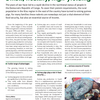Guinea pigs: a guarantee of food security and a source of income in South Kivu, Democratic Republic of Congo
South Kivu is one of the 11 provinces of the Democratic Republic of Congo which has suffered repeatedly from wars. Its livestock (cattle, sheep, goats, etc.) has been plundered and on occasions crops ravaged or pillaged at the expense of small farmers. Poverty and food insecurity have gained ground dramatically.
This situation cleared the path for guinea pig production and swept away any contempt and taboos they were formerly subject to when these animals were viewed as equivalent to rats or mice and their meat was considered unsuitable for consumption.
Today, guinea pigs are the only source of animal protein in the poor households of the region. In fact, they are consumed by virtually everyone, regardless of age and sex. This also accounts for the proliferation of small guinea pig restaurants in the local marketplaces. Moreover, guinea pigs provide a significant source income for households, which is spent on education for the children, access to primary health care, on purchasing clothes, etc. The good-quality manure is used to fertilise the fields, especially kitchen gardens.
The demand for guinea pigs is constantly growing, but the supply remains low. Additionally, breeding is still done in the traditional way, with very high levels of inbreeding. Therefore, a small centre for reproduction and selection of high-quality parent animals was set up in order to provide breeding pairs for local use.
Thierry Metre
Researcher and Coordinator
Association Villages Cobayes (VICO asbl)
(Village Guinea Pig Association)
South-Kivu, Democratic Republic of Congo
thierrymetre@yahoo.fr




